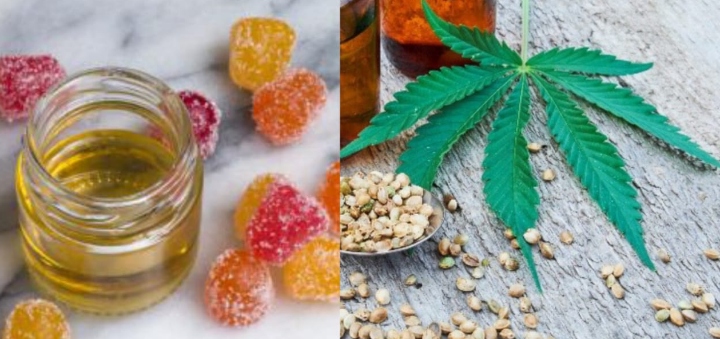It’s common to come across cannabidiol (CBD) promoted as an add-on to your morning coffee or smoothie.
There are also oils, gummies, and tinctures sold by different companies.
So, the question is: What exactly is CBD? And why is it so popular?
Is CBD same as Marijuana?
Cannabidiol, sometimes known as CBD, is the second most common active ingredient in cannabis (marijuana).
Even though cannabidiol is a crucial part of medicinal marijuana, it is either produced in a lab or directly extracted from the hemp plant, which is related to the marijuana plant.
CBD is one of hundreds of chemicals in marijuana, and it doesn’t get you “high” on its own.
The World Health Organisation said in a report that:
“CBD shows no signs of abuse or dependence potential in humans. There has yet no proof that using pure CBD is linked to any issues with public health.”
PAY ATTENTION: Help us continue to bring you more educational and entertaining content. Click this link to join our membership. You can cancel or pause anytime.
Is cannabidiol legal?
CBD is easily accessible in the majority of the United States.
All 50 states have laws legalising cannabidiol with varying degrees of restriction.
The FDA loosened regulations in December 2015 to make it possible for researchers to carry out CBD experiments.
It is now quite impossible to keep CBD illegal in the US thanks to the Farm Bill of 2018, which also made hemp legal.
The FDA loosened regulations in December 2015 to make it possible for researchers to carry out cannabidiol experiments.
The Farm Bill took all hemp-derived products, including CBD, off the Controlled Substances Act.
Essentially, this means that hemp-derived cannabidiol is legal while the one from cannabis (marijuana) is not.
Since CBD is legal in most places, a lot of people are currently purchasing it online without a medical marijuana licence.
The evidence for CBD’s health benefits
CBD is recommended for a wide range of medical conditions like Dravet syndrome and Lennox-Gastaut syndrome (LGS).
Numerous studies have shown that cannabidiol can lessen the frequency of seizures and, in certain situations, completely halt them.
Epidiolex, which contains cannabidiol, is the first cannabis-derived medication to be approved by the FDA for these conditions.
Studies on animals and human self-reports or studies indicate that cannabidiol may also be helpful for:
Anxiety: Research and clinical trials are looking into the widely reported anxiety-reducing effects of CBD.
Insomnia: Research indicates that CBD may be helpful for both getting to sleep and remaining asleep.
Chronic pain: Additional human research is required to support claims that CBD relieves pain. According to an animal study published in the European Journal of Pain, applying cannabidiol topically to the skin may help reduce arthritis-related pain and inflammation.
Additional studies reveal how cannabidiol may suppress neuropathic and inflammatory pain, which are challenging to treat.
Addiction: Some research in humans suggests that cannabidiol may help reduce cravings for tobacco and heroin in certain conditions.

A photo collage of CBD edibles; gummies and chocolate bar. Photo/courtesy
Is CBD safe?
Granted, most people have used cannabidiol products without experiencing any adverse effects.
Also, the buyer needs to conduct due diligence before buying a cannabidiol product.
This includes digging into the reputation of the company selling the product, especially in regard to user product reviews.
There are companies that have built a reputation for excellent products and that ship across the US and around the world.
How is CBD consumed?
There are numerous ways to consume cannabidiol, such as oils, extracts, pills, vape pens, patches, and topical skin preparations.
A topical CBD-infused oil, lotion, or cream—or even a bath bomb—can come in handy in relieving inflammation and pain in muscles and joints.
You can also spray or apply it under the tongue.
Make sure the cannabidiol you want to try comes from a reliable source.
Additionally, confirm with your physician that it won’t interfere with any other medications you use.
Who should avoid CBD?
CBD consumption isn’t recommended if you:
Are breastfeeding or pregnant: At this point, it is unknown how CBD affects pregnancy. The FDA advises pregnant women against taking any form of CBD product.
High dosages of cannabidiol can be harmful to an unborn child, according to at least one animal study.
Have liver disease: Research suggests that large dosages of the FDA-approved cannabidiol medication Epidiolex may cause liver damage in healthy individuals. It could be necessary to reduce the dosage for those who already have liver issues.
Have Parkinson’s disease: Research indicates that increased CBD dosages could worsen tremors and impaired muscle mobility in some people with Parkinson’s disease.
Are a child: Children with specific medical issues who are at least one year old are eligible to receive a prescription for the anti-seizure medication Epidiolex, which comes in a 25-milligramme dose.
However, it’s uncertain if cannabidiol products are generally safe for children. Keeping cannabidiol products in childproof containers is a prudent idea.
READ ALSO: Rwanda legalises cultivation of Marijuana
Conclusion
Make sure the CBD you want to try comes from a reputable source.
Additionally, confirm with your doctor that it won’t interfere with any other medications you could be taking.
If you reside outside the US, it’s crucial to think about a reputable source that ships worldwide.
PAY ATTENTION: Get in touch. Reach us at info@gotta.news.
























